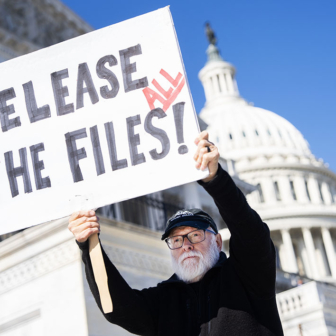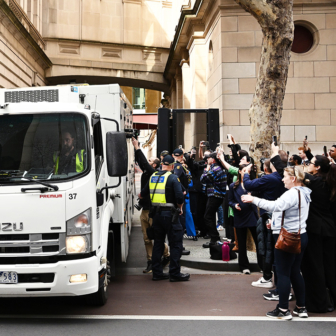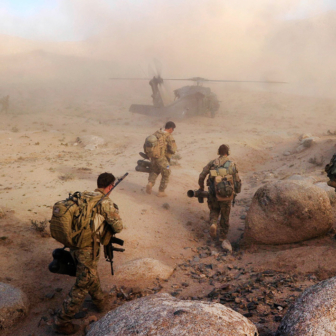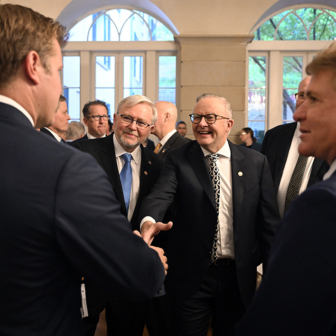When a disillusioned senior military analyst, Daniel Ellsberg, decided in 1971 to leak the highly sensitive Pentagon Papers to the New York Times, he spent night after night covertly smuggling out and photocopying 3000 pages of analysis and 4000 pages of government documents. When Bradley Manning, a US army private based in Iraq, decided to release a trove of top-secret material to WikiLeaks, it was a matter of smuggling it out on discs disguised as Lady Gaga albums. According to one estimate, the Pentagon Papers clocked in at two and a half million words. The diplomatic cables leaked by Manning amounted to a staggering 300 million words.
The Panama Papers, released in April 2016, were another quantum leap in size. Where the cables released by WikiLeaks had filled 1.7 gigabytes, the Panama Papers were 2.6 terabytes, or roughly 1500 times the size. They opened an unprecedented — and unprecedentedly detailed — window into how offshore shell companies were being used for tax evasion and international money-shifting.
The era of digital leaking is clearly upon us. The Panama Papers were emblematic not just of the relative ease of copying vast troves, but also of new opportunities for international cooperation among journalists. It was the innovative techniques of the Washington-based International Consortium of Investigative Journalists, or ICIJ, under its Australian director Gerard Ryle, that made the Panama Papers possible.
The story of that breakthrough began when two German investigative reporters, Bastian Obermayer and Frederik Obermaier, were contacted in 2015 by a source using the unpromising name of John Doe. The source wanted to expose criminal wrongdoing allegedly facilitated by a Panama-based law firm, Mossack Fonseca. “It will take years, possibly decades, for the full extent of the firm’s sordid acts to become known,” the source later wrote. “In the meantime, a new global debate has started, which is encouraging.”
The material soon overwhelmed the two journalists. “As more and more data sloshed in,” wrote Guardian editor Alan Rusbridger, “the Brothers Obermay/ier [as they were nicknamed] repeatedly had to purchase ever-larger computers…” The pair approached the ICIJ, which had a track record of collegial investigative work on similar, though much less ambitious, stories, including LuxLeaks, SwissLeaks and tobacco smuggling.
What followed has been described by one of the participants, Guardian journalist Luke Harding, as “a thrilling and secret year-long journalistic collaboration across more than eighty countries.” Almost 400 journalists set to work with the aim of publishing on 3 April 2016. “Via a secure platform called iHub,” writes Harding, “journalists were encouraged not to compete with each other but to share information actively and to swap leads and tips. We did, in a flurry of encrypted emails.” According to Rusbridger, his editor, “A new breed of data specialists from around the world had to be assembled to advise on encryption, creating databases, search software, data visualisations, graphics, and communications.” By the time the material was released, more than 107 media organisations in seventy-six countries had participated.
Simultaneous publication in so many countries gave the story great momentum. Mossack Fonseca, where the documents originated, was one of the five leading law firms advising clients on how to use tax havens. Most of its clients were legitimate businesses, but the firm also happily handled much murkier clients, including at least thirty-three people and companies blacklisted by the US government on the basis of evidence they’d been selling drugs, supporting terrorism or engaging in other major wrong-doing. The company had helped South African fraudsters who robbed the fund for widows and orphans of mineworkers, and they had helped the British criminals who perpetrated the 1983 “crime of the century” robbery of gold bars, diamonds and cash.
Much of the public focus was on the 140 politicians and public officials who had accounts with Mossack Fonseca, as well as those closely connected to political elites. Some clients had close ties to China’s president Xi Jinping, to allies of Vladimir Putin or to Ukrainian president Petro Poroshenko. (In response, China blocked the words “Panama Papers” behind the Great Firewall, and jammed the Guardian’s website, while Putin denounced what he called a Western “information attack.”) Mossack Fonseca had “serviced enough Middle East royalty to fill a palace,” said the ICIJ. The names of various celebrities came up, too, though none appeared to have engaged in illegality. British prime minister David Cameron was briefly embarrassed when his late father’s account was exposed, as was Malcolm Turnbull when the leak revealed funds he and former NSW premier Neville Wran had invested in what turned out to be a failed gold-mining venture in Siberia.
Now, just a year and a half later, come the Paradise Papers. Gerard Ryle has argued, quite plausibly, that this is the biggest leak of all, 13.4 million files compared with a mere 11.5 million for the Panama Papers. Much like its predecessor, the Paradise Papers leak is largely made up of files from a major law firm, in this case the Bermuda-based Appleby Global. The company specialises in offshore transactions, many of them based on the investors’ wish to hide assets and income and take advantage of Bermuda’s attractive tax rate (zero). Also like the Panama Papers, the initial leak was to the German newspaper Süddeutsche Zeitung. Publication on 6 November involved ninety-six media partners in sixty-seven countries.
The rash of revelations has put many people and companies in an uncomfortable spotlight. Donald Trump’s commerce secretary, billionaire Wilbur Ross, is exposed as being in business with a son-in-law of Vladimir Putin. Indeed, despite the publicity given to political tensions between Russia and the West, we now know that the links between Putin’s cronies and many Western businesses are much closer than in the past. Stephen Bronfman, an adviser and friend of Canadian prime minister Justin Trudeau, had millions of dollars invested in the Cayman Islands; as his boss was campaigning to close down such tax evasion, Bronfman’s company was lobbying to preserve it.
Global giants Apple and Nike have had their geographically convenient profits exposed. The Swiss-based mining giant Glencore could find itself pursued by the Australian Taxation Office. A clutch of celebrities — not least the Queen, who pays tax voluntarily but whose estate makes good use of Appleby — will be subjected to short-term embarrassments.
But beyond the immediate embarrassment, will the leak have a significant real-world impact? If the Panama Papers are any guide, then the answer is yes.
Although they didn’t result immediately in sweeping reforms, and although dubious financial movements still happen on an enormous scale, the Panama Papers led to major reforms and claimed some high-profile scalps. In Australia, the Australian Taxation Office began investigating 800 of the company’s high-net-wealth clients. (Although most of the activities were legal, this pointed to the inadequacy of the law.) The papers exposed the use of foreign trusts in New Zealand, which then reformed its disclosure laws; as a result, the number of foreign trusts registered in New Zealand dropped from almost 12,000 to below 3000.
There were also some notable political casualties. The most spectacular was Iceland’s prime minister, Sigmundur Gunnlaugsson, who was ambushed in the middle of what began as a soft interview on Swedish television. When he was asked about tax havens, Gunnlaugsson said that his country placed great emphasis on everyone paying his or her fair share. But when a second journalist quizzed him in detail about his and his wife’s accounts with Mossack Fonseca, he stormed out of the studio. A few days later, he resigned.
The exposure of the offshore investments of Pakistan’s prime minister, Nawaz Sharif, and his children led to lengthy investigations. Sharif was eventually forced to resign in July 2017 after the country’s Supreme Court found against him.
The impact of the Paradise Papers can only be guessed at. After the Panama Papers, the German journalists Obermayer and Obermaier optimistically proclaimed, “No one, anywhere, who conducts secret transactions and leaves a digital trace is safe anymore.” And the scale of the enterprises being investigated is enormous: according to a leading scholar in the area, Gabriel Zucman, about US$7.6 trillion is held in tax havens globally, or about 8 per cent of the world’s financial wealth. ⦁




